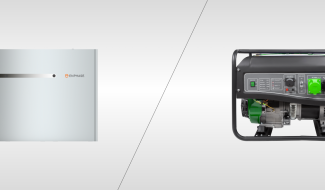Electricity backup for homes and businesses is not a new concept, but the options available are rapidly expanding. Grid outages due to severe weather events are also making this an important decision for many homes across the United States. Which one is best for your home?
What is the difference between a battery and a generator?
Option 1: The Gasoline Generator
Typical gasoline-powered generators have been around for over a century. Chances are, you already have a gas generator at home. Matter of fact, you probably have more than one. For example, your car is a generator. However, that would be an inefficient way to power your home.
Household generators can be relatively compact and are often mobile. As a result, you can take it with you if you need power in a remote location. Gasoline-powered generators can be a good option for some due to their compact form factor and mobile-ready design. They are also relatively cheap to buy.
The downside is that you need to purchase and store gasoline to fuel it. Gasoline can be dangerous if not stored properly and the exhaust contributes to greenhouse gas emissions. Of course, there is also the noise factor.
Pros and Cons of the Gasoline Generator
| Pros | Cons |
|---|---|
| Compact form factor | Carbon-intensive |
| Mobile | Requires gasoline storage |
| Gasoline as fuel is readily available | Considerable ongoing cost of gasoline |
| Lower upfront cost | Lacks smart software |
| Slower switch to backup mode | |
| Loud operation |
Option 2: Battery Storage
Battery storage, typically referred to as simply “energy storage”, is a relatively new option for households and has become more mainstream over the last several years. While more and more brands are offering energy storage equipment, Enphase has been selling batteries overseas for years. As a result, Enphase has built multiple generations of inverters and batteries leading to a proven and reliable solution for the marketplace.
Energy storage equipment is installed at your home and charges internal batteries using power from your home solar system or from the local electricity grid. No trips to your local fuel pump are necessary and you no longer need to store gasoline in your garage. It is also so quiet that you would not otherwise know it is working behind the scenes.
Energy storage can provide backup power for your home to power critical loads during a grid outage – just like a traditional gasoline-powered generator. It also has smart software that allows it to automatically switch between charging and discharging modes.
This automation can reduce utility costs for electricity customers that are forced deal with time-of-use rates or demand charges. Specifically, these features are called “load shifting” and “peak demand shaving”, respectively. This gives you back control over your energy usage and flexibility to deal with variable conditions.
If you are away from home and an outage occurs, you also have the peace of mind that comes as energy storage seamlessly switches to critical appliances to keep them running. Gasoline generators can take minutes to kick in and often requires manual switching to provide backup power. No one wants to return home to a flooded basement or a fried computer from a nasty jolt of electricity.
Unlike a gasoline generator, energy storage systems are carbon-free when charged from renewable energy like home solar power. This charging cost can be significantly lower when compared to gasoline when designed correctly for your home.
It is important to note that energy storage is a longer-term investment than a gasoline generator because it is a more technologically advanced solution. This investment is maximized through incentives like the federal solar investment tax credit (when combined with solar) or state energy storage rebates like California’s Self-Generation Incentive Program.
Pros and Cons of Energy Storage
| Pros | Cons |
|---|---|
| Seamless automated backup | More expensive upfront costs |
| Carbon-free when charged with renewable energy | Typically requires a licensed installer |
| Smart software for backup power capacity, load-shifting, and peak demand shaving | Fixed location |
| Low fuel costs (electricity) | |
| Quiet operation |
Battery backup power vs. generators: What is the best option?
The best backup system for your home depends on your needs. One or more Enphase Encharge 10 storage solutions can provide fully automated battery backup without the need for fossil fuels while a gasoline-generator can provide mobile flexibility and lower upfront cost.
Depending on where you live, there is good reason to consider backup power. Households in California are facing regular utility planned power outages while east coasters confront annual unpredictability of storm-related outages. No matter where you live, an automated solution like solar plus storage can provide security for unforeseen events.
Our network of certified installers can help you understand which solution might be best for you. Our all-in-one solar plus energy storage solution combines the benefits of both in a fully integrated package to keep your home powered by renewable energy, even during a grid outage.


